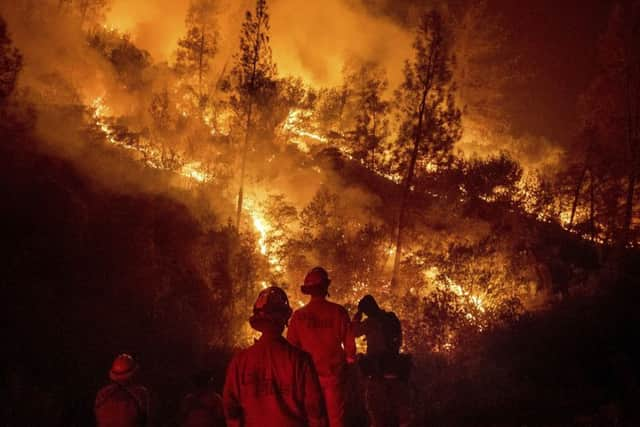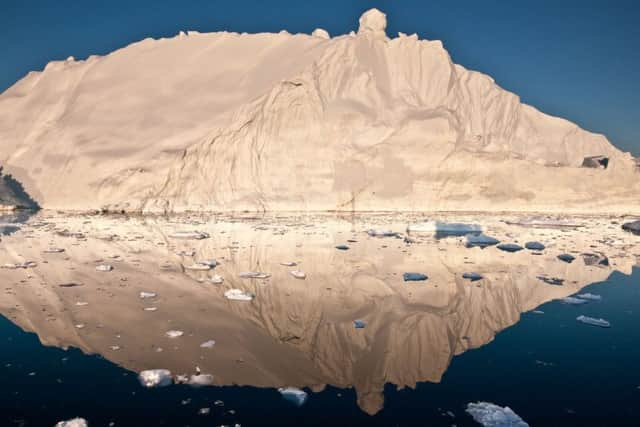Climate change - are we living in a global hothouse
For many people it has been a long, blissful summer. Sales of ice creams, barbecues and paddling pools have soared with the temperatures as the country has basked in the sunshine.
Last month saw the hottest July day in the UK ever recorded and the balmy weather, which started back in May, has continued into August – at one point even drawing comparisons with the fabled summer of 1976 when the temperature topped 80F (which was how it was measured back then) every day for almost a month.
Advertisement
Hide AdAdvertisement
Hide AdHowever, Britain isn’t the only place that’s been sweltering in the heat and for other parts of the world the extreme weather has brought destruction and tragedy.


The sight on the TV news channels of giant planes dropping fire retardant on vast forest fires in California was like something straight out of a Hollywood disaster movie, only the fires are real and they’re still raging.
Officials say they are dealing with the largest wildfire to ever hit the state after two blazes joined together into a single conflagration estimated to be the size of Los Angeles.
Across California 14,000 firefighters are battling 18 major fires that have carved their way through forests and woodland and are threatening urban areas.
Advertisement
Hide AdAdvertisement
Hide AdAt least nine people have died since the fires, which have coincided with record-breaking temperatures, broke out last month – and the worst months of wildfire season are still to come.


One the other side of the world the situation is also dire. Australia’s most populated state, New South Wales, is now entirely in drought, with a dry winter intensifying what has been called the worst drought in living memory in parts of eastern Australia.
Farmers have told harrowing stories of failing crops, severe water shortages and being unable to feed livestock, with the state and federal governments forced to step in and provide £330m in emergency relief funding.
Last month in Japan it wasn’t heat but torrential rain that brought disaster, triggering landslides and floods that left at least 200 people dead. To make matters worse, just weeks later an “unprecedented” heatwave claimed more than 65 lives.
Advertisement
Hide AdAdvertisement
Hide AdCloser to home, swathes of Europe, including in Germany, France, Portugal and Spain have had to contend with oppressive levels of heat and near-record-breaking temperatures.
In Greece, this turned to tragedy when more than 80 people were killed when wildfires broke out near Athens.
Even in parts of northern Europe, not used to such unseasonally hot weather, there have been reports of a melting mountain in Sweden and record heat in the Arctic Circle sparking drought and fires.
Although such extreme weather is not unprecedented, many scientists are concerned that it is growing in frequency. Earlier this week climate experts warned that the Earth may be decades away from a tipping point triggering a state of uncontrollable climate change that threatens the future of humanity.
Advertisement
Hide AdAdvertisement
Hide AdThey said this threshold will be reached when average global temperatures are just 2C higher than they were in pre-industrial times – they are already 1C higher, and rising.
Professor Johan Rockstrom, a leading member of the team from the University of Stockholm, likened it to a row of dominoes. “Once one is pushed over, it pushes Earth towards another. It may be very difficult or impossible to stop the whole row of dominoes from tumbling over.”
Commenting on the findings, climate researcher Dr Phil Williamson, from the University of East Anglia, said: “In the context of the summer of 2018, this is definitely not a case of crying wolf, raising a false alarm. The wolves are now in sight.”
The spotlight is once again on climate change and the increasingly detrimental impact it is having on communities all over the world.
Advertisement
Hide AdAdvertisement
Hide Ad“We know that there are changes happening, whether that’s in very hot countries or in the polar regions,” says Dr Anna Hogg, from the School of Earth and Environment at the University of Leeds.
Today, satellite data allows scientists to monitor meteorological data in a way that wasn’t possible even just a decade ago.
“We know in Antarctica the ice is changing now more rapidly than it was say 25 or 30 years ago. In Western Antarctica we’re seeing ice sheets thinning by up to nine metres a year.
“That’s equivalent to the height of a three-storey building melting into the ocean and we know that’s contributing to the rise in sea level globally and we know environmental changes, whether that’s warming oceans or a warming atmosphere, is causing the Antarctic to be out of balance right now,” she says.
Advertisement
Hide AdAdvertisement
Hide AdAntarctica is a huge ice mass – it’s 4km thick of ice and holds 90 per cent of the world’s fresh water – and even though it is thousands of miles away from Britain what happens there can impact on our shores.
“Around 80 per cent of the world’s population lives around coastlines, and though Antarctica can seem like this remote faraway place that doesn’t affect our lives, actually it has a big impact on the rate of sea level rises in the Northern Hemisphere.”
In Britain, flooding has been a bigger concern than heatwaves in recent years. Coastal flooding is different from inland flooding, which is caused by rivers overflowing or the sheer volume of water from torrential downpours, and occurs when sea levels rise steadily over time, combined with storm surges brought about by bad weather that coincides with a high tide.
It’s something that’s been experienced on the Yorkshire coast. “In our region it’s something we should be concerned about,” says Dr Hogg.
Advertisement
Hide AdAdvertisement
Hide Ad“In 2013, Scarborough and Hull were hit by a bad storm surge. You see on the news the impact of the events at the time but then you get reports a year later showing businesses that were hit were still having to do deal with repairs, so the consequences are much longer lasting.”
The UK Climate Change Commission has said that coastal flooding poses one of the biggest climate-related risks to the UK. It also has profound repercussions for future infrastructure planning.
“It’s not just about people’s homes, it’s also about things like roads, or railway lines and nuclear power plants,” says Dr Hogg.
The challenge for scientists is to try and pinpoint where changes are happening and also the rate at which they’re occurring.
Advertisement
Hide AdAdvertisement
Hide Ad“These are both really important in working out what the world is going to look like a hundred years from now.
“We need to do this in order to build our roads in the right places and build our flood defences high enough.
“Which is why we have to keep collecting long-term climate data records because that allows us to disentangle short-term weather events from long-term, permanent change.”
Why we can all make a difference
With so much doom and gloom in the news about climate change it can feel bewildering to those trying to make sense of it all.
Advertisement
Hide AdAdvertisement
Hide AdHowever, as Dr Hogg points out, there are things individuals can do to mitigate, even in some small way, its impact.
There are obvious things like using less energy, as the less fossil fuels we burn the less carbon dioxide will enter the atmosphere. We can choose to buy our energy from renewable energy suppliers.
“Also it’s important that people don’t get bored by the topic because it’s in the news all the time and try and understand what’s happening and become an advocate for action.
“If politicians see that it matters to ordinary people they’re more likely to try and do something about it.”